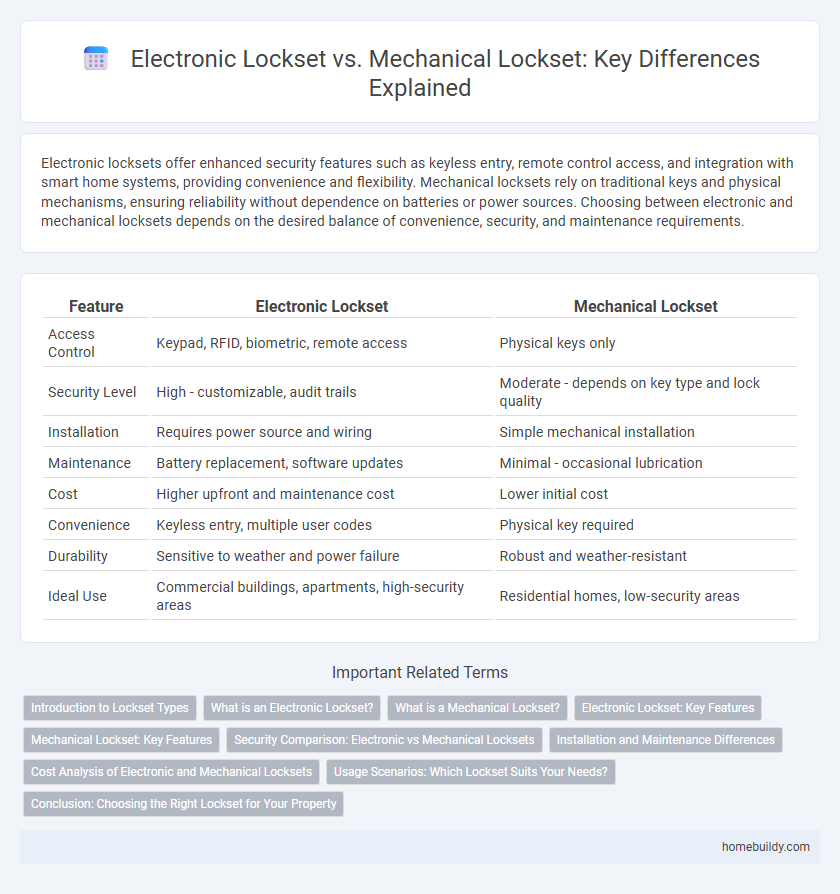Electronic locksets offer enhanced security features such as keyless entry, remote control access, and integration with smart home systems, providing convenience and flexibility. Mechanical locksets rely on traditional keys and physical mechanisms, ensuring reliability without dependence on batteries or power sources. Choosing between electronic and mechanical locksets depends on the desired balance of convenience, security, and maintenance requirements.
Table of Comparison
| Feature | Electronic Lockset | Mechanical Lockset |
|---|---|---|
| Access Control | Keypad, RFID, biometric, remote access | Physical keys only |
| Security Level | High - customizable, audit trails | Moderate - depends on key type and lock quality |
| Installation | Requires power source and wiring | Simple mechanical installation |
| Maintenance | Battery replacement, software updates | Minimal - occasional lubrication |
| Cost | Higher upfront and maintenance cost | Lower initial cost |
| Convenience | Keyless entry, multiple user codes | Physical key required |
| Durability | Sensitive to weather and power failure | Robust and weather-resistant |
| Ideal Use | Commercial buildings, apartments, high-security areas | Residential homes, low-security areas |
Introduction to Lockset Types
Electronic locksets offer advanced security features such as keyless entry, remote access, and audit trails, making them ideal for modern residential and commercial applications. Mechanical locksets rely on traditional keys and physical locking mechanisms, known for their reliability, simplicity, and low maintenance requirements. Choosing between electronic and mechanical locksets depends on factors like security needs, convenience, installation complexity, and budget considerations.
What is an Electronic Lockset?
An electronic lockset is a door locking mechanism that uses digital technology for access control, often incorporating keypads, biometric sensors, or RFID cards instead of traditional keys. These locksets enhance security by allowing remote monitoring, programmable access codes, and audit trails of entry activity. They are commonly used in commercial buildings and smart homes where advanced security features and convenience are essential.
What is a Mechanical Lockset?
A mechanical lockset is a traditional locking mechanism that relies on physical keys and manual operation to secure doors. It typically consists of components such as a latch, deadbolt, and cylinder, providing reliable security without the need for electronic power sources. Mechanical locksets are widely used in residential and commercial settings due to their simplicity, durability, and ease of installation.
Electronic Lockset: Key Features
Electronic locksets offer advanced security with keyless entry options such as PIN codes, RFID cards, or biometric authentication, enhancing access control flexibility. These locksets provide real-time monitoring and audit trails, allowing property managers to track usage and improve safety protocols. Integration with smart home systems and remote management capabilities further distinguishes electronic locksets from traditional mechanical counterparts.
Mechanical Lockset: Key Features
Mechanical locksets offer robust durability, requiring no batteries or electronic components, which ensures reliable operation even during power outages. They typically feature keyed entry with traditional pin tumbler or wafer mechanisms, providing straightforward security with minimal maintenance. Their simplicity and resistance to hacking make them a preferred choice for high-traffic commercial buildings and residential properties aiming for cost-effective, long-lasting locking solutions.
Security Comparison: Electronic vs Mechanical Locksets
Electronic locksets offer advanced security features such as encryption, audit trails, and remote access control, significantly reducing the risk of unauthorized entry. Mechanical locksets rely on physical keys and traditional pins or levers, which are vulnerable to picking, bumping, and key duplication. Electronic systems provide real-time monitoring and immediate lockdown capabilities, enhancing overall security beyond the capabilities of mechanical locksets.
Installation and Maintenance Differences
Electronic locksets require professional installation due to wiring and integration with access control systems, while mechanical locksets offer straightforward installation with basic tools. Maintenance for electronic locksets involves battery replacement and software updates to ensure security and functionality, whereas mechanical locksets primarily require periodic lubrication and key duplication. These differences impact overall cost and convenience depending on user needs.
Cost Analysis of Electronic and Mechanical Locksets
Electronic locksets have higher upfront costs due to advanced technology and installation requirements, typically ranging from $150 to $500 per unit, while mechanical locksets usually cost between $20 and $100. Maintenance expenses for electronic locksets can increase over time because of battery replacements and software updates, whereas mechanical locksets require minimal servicing with occasional key replacements. Considering long-term costs, mechanical locksets offer affordability and simplicity, whereas electronic locksets provide enhanced security features at a premium price point.
Usage Scenarios: Which Lockset Suits Your Needs?
Electronic locksets offer advanced access control ideal for high-security environments such as commercial buildings, hotels, and smart homes requiring keyless entry and remote management. Mechanical locksets remain reliable and cost-effective for residential use or low-traffic areas where simplicity and durability are prioritized. Choosing between electronic and mechanical locksets depends on factors like desired security level, convenience, installation complexity, and budget constraints.
Conclusion: Choosing the Right Lockset for Your Property
Electronic locksets offer advanced security features such as keyless entry, remote access, and audit trails, making them ideal for high-tech homes and commercial properties. Mechanical locksets provide reliable, cost-effective security with minimal maintenance, suitable for traditional settings or budget-conscious users. Selecting the right lockset depends on your property's security needs, budget, and desired convenience.
Electronic lockset vs Mechanical lockset Infographic

 homebuildy.com
homebuildy.com